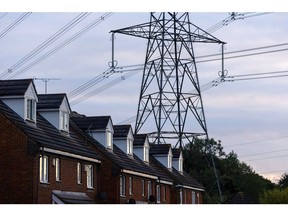
Article content
(Bloomberg) — UK inflation jumped more than forecast to its highest rate in more than a year as households were hit by a raft of price increases during what has been dubbed “awful April” in the British media.
THIS CONTENT IS RESERVED FOR SUBSCRIBERS ONLY
Subscribe now to read the latest news in your city and across Canada.
- Exclusive articles from Barbara Shecter, Joe O'Connor, Gabriel Friedman, and others.
- Daily content from Financial Times, the world's leading global business publication.
- Unlimited online access to read articles from Financial Post, National Post and 15 news sites across Canada with one account.
- National Post ePaper, an electronic replica of the print edition to view on any device, share and comment on.
- Daily puzzles, including the New York Times Crossword.
SUBSCRIBE TO UNLOCK MORE ARTICLES
Subscribe now to read the latest news in your city and across Canada.
- Exclusive articles from Barbara Shecter, Joe O'Connor, Gabriel Friedman and others.
- Daily content from Financial Times, the world's leading global business publication.
- Unlimited online access to read articles from Financial Post, National Post and 15 news sites across Canada with one account.
- National Post ePaper, an electronic replica of the print edition to view on any device, share and comment on.
- Daily puzzles, including the New York Times Crossword.
REGISTER / SIGN IN TO UNLOCK MORE ARTICLES
Create an account or sign in to continue with your reading experience.
- Access articles from across Canada with one account.
- Share your thoughts and join the conversation in the comments.
- Enjoy additional articles per month.
- Get email updates from your favourite authors.
THIS ARTICLE IS FREE TO READ REGISTER TO UNLOCK.
Create an account or sign in to continue with your reading experience.
- Access articles from across Canada with one account
- Share your thoughts and join the conversation in the comments
- Enjoy additional articles per month
- Get email updates from your favourite authors
Sign In or Create an Account
or
Article content
Article content
Increases to energy, water and other administered prices pushed inflation to 3.5% from 2.6%, the Office for National Statistics said Wednesday. It was above the 3.4% forecast by the Bank of England and the 3.3% economists expected.
Article content
Article content
Services inflation, watched closely by the BOE for signs of underlying price pressures, accelerated to 5.4% from 4.7%. The central bank had expected a rate of 5%.
Article content
By signing up you consent to receive the above newsletter from Postmedia Network Inc.
Article content
The figures largely reflect a 6.4% increase in the energy cap — the maximum suppliers are allowed to raise prices for gas and electricity. Consumers also faced higher water bills, train fares and local authority taxes as a wide range of basic costs went up.
Article content
The sharp increases coincided with the introduction of a £26 billion ($34.8 billion) boost to the payroll taxes paid by employers and a near 7% rise in the minimum wage, both announced in the October budget. Surveys suggested that a high proportion of firms were planning to raise prices in a bid to protect their margins.
Article content
It leaves inflation well above the 2% target, with the BOE expecting the rate to accelerate further to a peak of 3.7% in September. That’s a fresh blow for Prime Minister Keir Starmer, as households face a renewed cost-of-living squeeze at a time when Donald Trump’s tariffs are weighing on the economic outlook.
Article content
The pickup is expected to prove temporary and the BOE is not anticipating second-round effects where workers and firms respond by raising pay demands and prices. However, with wage growth still stubbornly high, policymakers continue to favor a gradual approach to cutting interest rates.
Article content
Article content
—With assistance from Mark Evans, Harumi Ichikura and Joel Rinneby.
Article content

.jpg) 6 hours ago
2
6 hours ago
2
 English (US)
English (US)